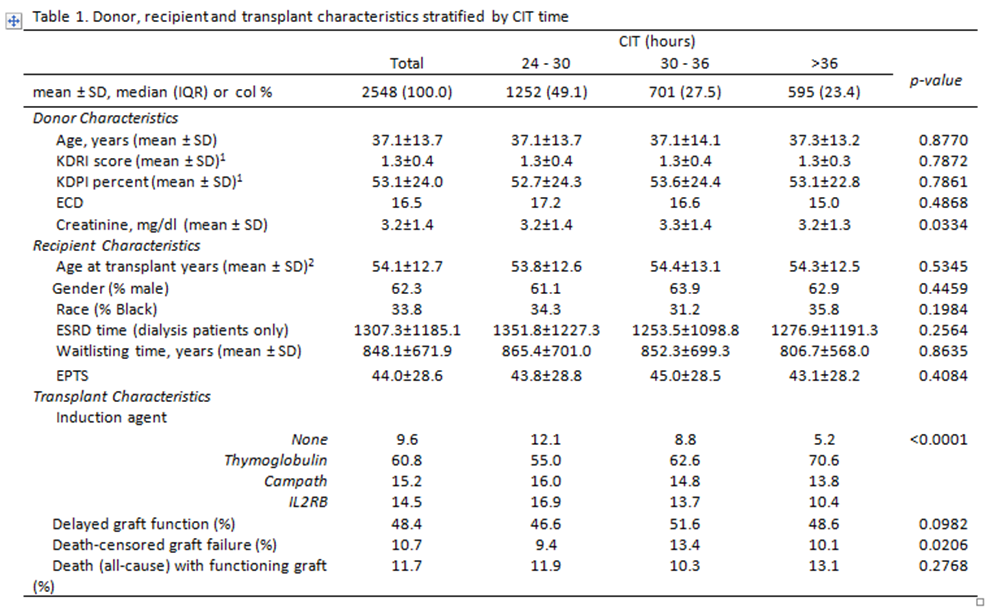Outcomes with Kidney Transplant from Deceased Donors with Acute Kidney Injury and Prolonged Cold Ischemia Time: UNOS Analysis.
Nephrology, Columbia University Medical Center, New York, NY
Meeting: 2017 American Transplant Congress
Abstract number: 328
Keywords: Cadaveric organs, Kidney transplantation, Outcome
Session Information
Session Name: Concurrent Session: Donors with Acute Kidney Injury
Session Type: Concurrent Session
Date: Monday, May 1, 2017
Session Time: 4:30pm-6:00pm
 Presentation Time: 5:18pm-5:30pm
Presentation Time: 5:18pm-5:30pm
Location: E450a
Longer cold ischemia time (CIT) is associated with an increased risk of delayed graft function and may increase the risk of graft failure. Kidneys with acute kidney injury (AKI) are associated with an increase in DGF but have excellent graft survival. There are few data looking at outcomes of kidney transplants from donors with AKI and long CIT.
We analyzed UNOS data of the 2548 deceased donor KT recipients from 1/1/05-6/30/15 who received a KT from an AKI donor (terminal creatinine ≥ 2.0) and had long CIT (≥24 h). Recipients were categorized as having CIT of 24-30 hrs, 30 -36 hrs and > 36 hrs. Categorical variables were compared using Chi-squared test and continuous variables were compared using ANOVA.
Median follow up was 3 years (IQR 4.4). Recipient, donor and transplant characteristics are shown in table 1.  There were no significant differences in recipient demographics or donor characteristics between groups. Rates of DGF were high but similar between groups. On multivariate analysis, choice of induction agent, donor KDPI and recipient EPTS were not associated with an increased risk of DGF. On multivariable analysis, there was a lower risk of death with use of thymoglobulin (AHR 0.645, p=0.004) or Campath (AHR 0.607, p=0.013) compared with no induction agent.
There were no significant differences in recipient demographics or donor characteristics between groups. Rates of DGF were high but similar between groups. On multivariate analysis, choice of induction agent, donor KDPI and recipient EPTS were not associated with an increased risk of DGF. On multivariable analysis, there was a lower risk of death with use of thymoglobulin (AHR 0.645, p=0.004) or Campath (AHR 0.607, p=0.013) compared with no induction agent.
Kidney transplants from deceased donors with AKI and long CIT have excellent graft survival, even with CIT > 36 hours. The high rate of DGF does not impact long-term patient or graft survival. Induction with thymoglobulin or Campath was associated with improved patient survival in recipients of these kidneys.
CITATION INFORMATION: Dube G, Mohan S, Chiles M. Outcomes with Kidney Transplant from Deceased Donors with Acute Kidney Injury and Prolonged Cold Ischemia Time: UNOS Analysis. Am J Transplant. 2017;17 (suppl 3).
To cite this abstract in AMA style:
Dube G, Mohan S, Chiles M. Outcomes with Kidney Transplant from Deceased Donors with Acute Kidney Injury and Prolonged Cold Ischemia Time: UNOS Analysis. [abstract]. Am J Transplant. 2017; 17 (suppl 3). https://atcmeetingabstracts.com/abstract/outcomes-with-kidney-transplant-from-deceased-donors-with-acute-kidney-injury-and-prolonged-cold-ischemia-time-unos-analysis/. Accessed February 11, 2026.« Back to 2017 American Transplant Congress
